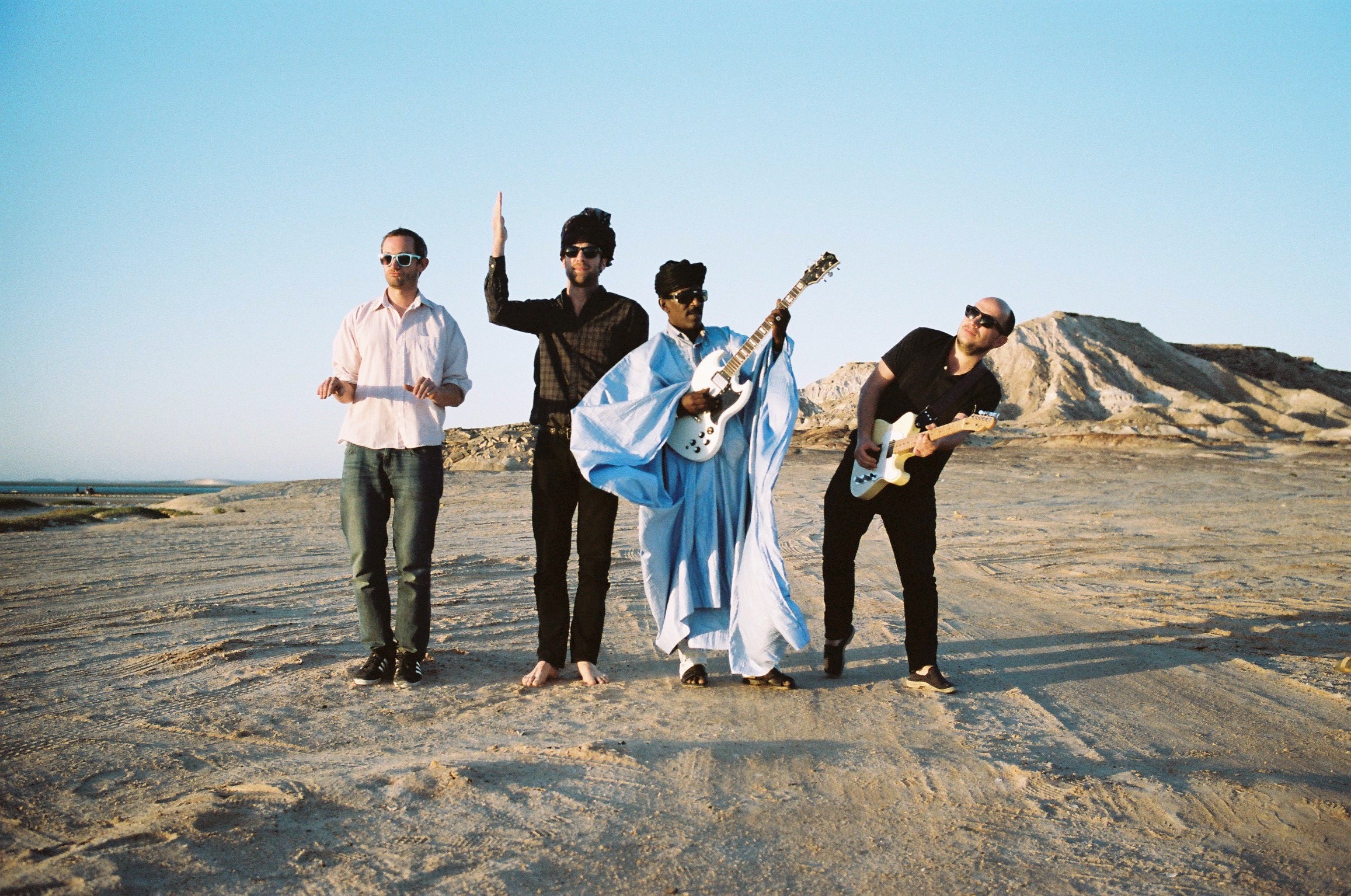
Dakhla Sahara Session is the unvarnished anti-world musical account of a rough, complex and laborious encounter between two very different bands: Group Doueh and Cheveu.
They’re different because the latter travel along the routes of the European punk, the French prisons and the rehearsal basements of Paris’ suburbs, while the former travels in the Mauritanian desert, the Sahrawi weddings and the music room of the family house. From the beginning, this very encounter was meant to give a hard time to the producer of the album, JB, whose label Born Bad is more used to releasing pop-formatted records, though generally sounding very punk, post punk or unclassifiable – as Cheveu are.
This album takes the listener right into a 10-day human epic odyssey, passing through its attempts, its failures and its moments of grace. This album speaks for the musicians and says: we spilled our guts out, we reached complete exhaustion and total freedom in this illogical, unprepared and expectation-free encounter. This album says: we made it, both happy and tired, and we provide as evidence this 42-minute long musical trance, free of pretension but full of emotion.
One year after the recording of the album, we met two members of the trio Cheveu in Paris: David Lemoine (vocals) and Étienne Nicolas (guitar).
Pan African Music (PAM) : Dakhla Sahara Sessions was released the 10th of February. When was the last time you listened to the record?
David Lemoine (D) : Last week, while preparing for the interviews. And you know what? I found it really good.
Étienne Nicolas (E) : So did I. I listened to it last week, when the video clip for “Moto 2 Places” was published. I really enjoyed it, and I even think it sounds better on vinyl. And I always put the song “Charaa” on repeat. This song is a true miracle! For our previous albums, we would spend a lot of time re-recording demo versions of the same track, and we’d try 15 different mixes… and in the end we’d just lose the will to listen to the record once released. Our listening pleasure feels very different with this album.
PAM : A 10-day session abroad, and then back home to France : you surely weren’t used to this kind of experience, were you?
E and D : For sure: we had only 10 days to give our best, and not two years, as usual.
D : And that’s no easy task when your own producer [Born Bad’s boss JB] puts pressure so he has enough material release an album at the end of the 10 days.
PAM : In the album’s booklet, journalist Jacques Denis [who works for Libération and Le Monde Diplo, amongst other medias] explains how difficult the first days of the sessions were. You’re not trying to embellish the encounter with Group Doueh and turn it into a magical and easy creative moment.
E : Well, in fact we’ve been pretty productive from the first day, and we even kept some of the songs the way we recorded them at that moment. Thus we felt reassured and encouraged from the beginning. But halfway through the sessions, doubts started to appear. We realized we still had not properly met Group Doueh’s members: we had to have tea with them, and share each others’ music, culture and customs. That’s what we eventually did on the third day only.
PAM : I guess this is typical of when people coming from two very different cultures meet. Did you know anything about the Sahrawi culture before going to Dakhla?
E : Not at all. We only knew it was a very matriarchal culture, and you really can see that: women have a real power in social life, and in music too. It’s half women, half men in their bands. This sure is a good thing.
D : There are way more women in the Sahrawi bands than in the French bands!
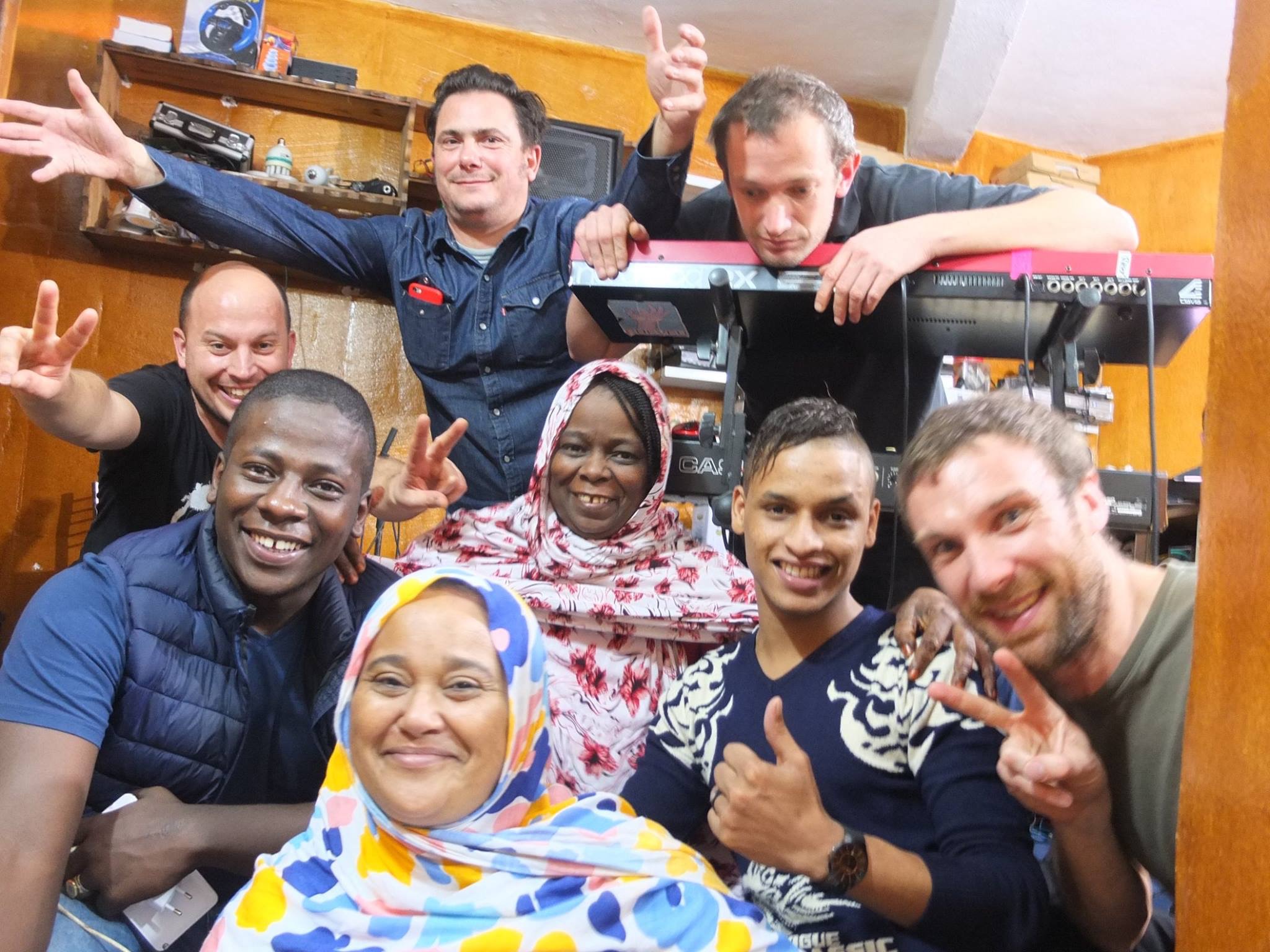
PAM : So I guess they must have been surprised to see this all-men crew show up at their home: the three members of Cheveu, your producer and journalist Jacques Denis…
D : We were even more people! More than a soccer team, I guess! The three of us, sound engineer Laurent [de Boisgisson], our producer JB, Jacques [Denis], José [Kamal, Moroccan producer and promotor who initiated this musical encounter], Arnaud Contreras [photographer, and author of the book Sahara Rocks!], a friend of his, and a 4-piece TV film crew… We were 13, maybe 14 guys, only men! And we clearly invaded their intimacy without any kind of refinement. We even brought a whole studio in their house!
PAM : Wait… There was no recording equipment in Group Doueh’s music room?
D : No! We had to bring One Two Pass It studio’s equipment from Montreuil [next to Paris] to Dakhla. And we had an amazing sound engineer, Laurent, who is used to all kinds of situations, and really helped us there. People know him as the sound tech for the speeches of the African governments.
E : He played such a decisive part so we would succeed in playing all together. Several times we felt lost, because of this unlikely mix between their off-beat rhythms and ours, rather binary – even if we sometimes fancy using ternary beats. As Laurent is a professionally trained drummer, and is fond of funk and hip hop, he knows how the groove works and could make the whole thing sound good. In fact, he’s the one who directed the sessions.
D : He also helped a lot with the human side of things. When 15 people enter your house, set up their whole stuff, play standing, while you play seated… this tended to make us show more self-restraint. Well, this is what I felt until Laurent helped us let go.
PAM : In the booklet, again, Jacques Denis explains that things started to get smoother when Cheveu did a punk-noise version of “Azawan”, one of Group Doueh’s songs.
E : This is true, and that was one of the two moments that made us feel reassured. Group Doueh are used to playing “Azawan” on a slow tempo, and we came up with idea of doing a binary, rough and punk version with a distorted guitar intro à la Stooges’ “Search & Destroy”. It’s Doueh himself on the guitar! The other decisive moment is the song “Charaa”. It’s based on one of or ideas: we launched a ternary stuff on the drum machine, like a waltz, and all of a sudden, Group Doueh started to play one of their songs on top of it. They ended up covering Olivier’s rhythm box, and he even decided to lower its volume [author’s note: you can hear it at 1m57s]! Then they added all their percussions and Doueh’s electrified tidinit [author’s note: a Mauritanian luth played by men only] … The whole thing leads you to an amazing trance feeling.
D : When we listened to “Charaa” again, we felt this song was a true miracle.
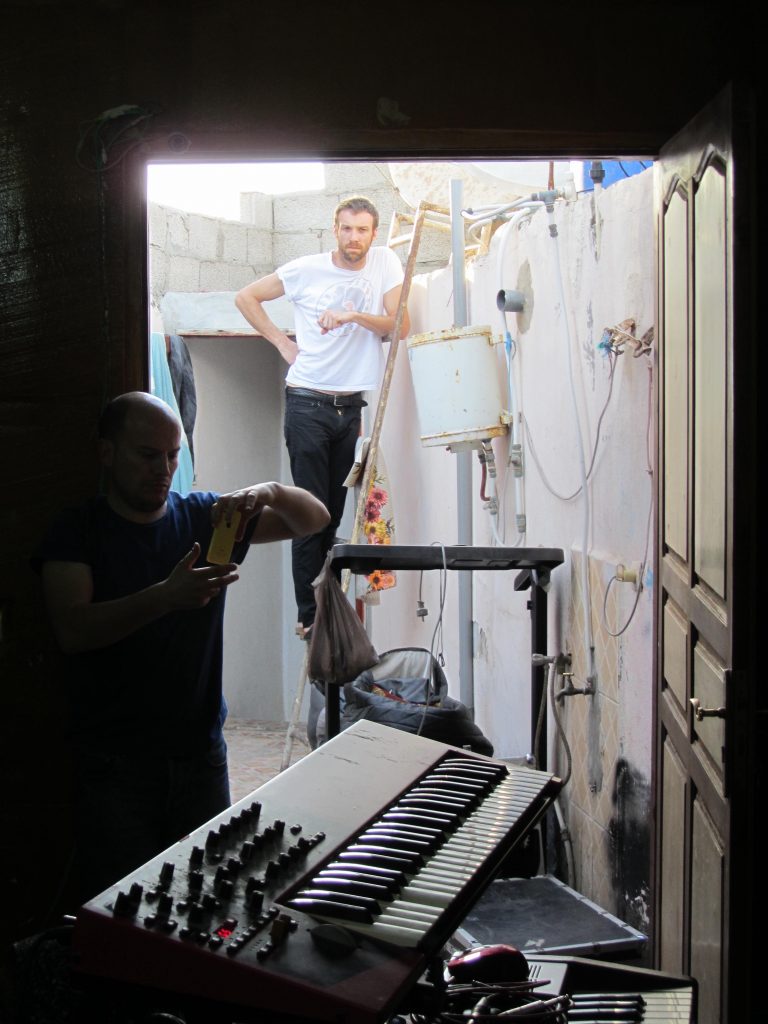 PAM : Actually, I really wanted to interview you guys, because while listening to the album, I felt I was able to hear the musical account of a really difficult human and cultural encounter. The record has some flaws, and doesn’t seem to have been polished. I think it’s an audacious commercial gesture to release this album. Did you have a discussion with the label regarding the tracklist?
PAM : Actually, I really wanted to interview you guys, because while listening to the album, I felt I was able to hear the musical account of a really difficult human and cultural encounter. The record has some flaws, and doesn’t seem to have been polished. I think it’s an audacious commercial gesture to release this album. Did you have a discussion with the label regarding the tracklist?
D : We did not have much choice. We released almost everything we had recorded during the sessions, except for one song.
E : We had to exclude one song because there was not enough room on the vinyl.
D : It’s true that the album kind of sounds uneven and not completed, but I guess its spontaneity and freshness compensate. You have to see it as a holiday snapshot. And I think you’ve got to have balls to release it this way.
PAM : The way you compose music is very different from Group Doueh’s?
D : It’s a bit difficult to understand because, I guess, they don’t compose very often. They permanently recycle old melodies, rhythms and lyrics that they keep on updating. In fact, they improvise inside timeless and musical presets, like the quarter-tone scale and other specific stuff… So every time we’d propose the basis for a new track, Group Doueh would just play an already completed song on top of it… and we’d add our own layer over it, and so on and so forth.
PAM : Would you say this confrontation worked well?
D : I think so. You could have imagined the result to be some kind of “world music fusion”, but in fact the album sounds like two bands who don’t know very well how to understand each other, and decided to pile songs on top of other songs. I think that’s what make the music so rich.
AND JUST WHEN YOU’D THINK THE ROCK BAND WOULD EAT THE TRADITIONAL MUSIC GROUP REGARDING ENERGY… IT WAS THE OTHER WAY AROUND! WE DID HAVE TO TURN UP THE VOLUME ON OUR AMPS!
PAM : You say it was more a confrontation than a fusion. How so?
E : We come from two very opposite worlds, but we both follow a DIY spirit, and we both have the same intensity while playing, always very loud. And here you have the confrontation: it was a matter of who’d play the loudest, who’d outdo the other. And you really can hear it on the album.
D : And just when you’d think the rock band would eat the traditional music group regarding energy… it was the other way around! We even have to turn up the volume on our amps!
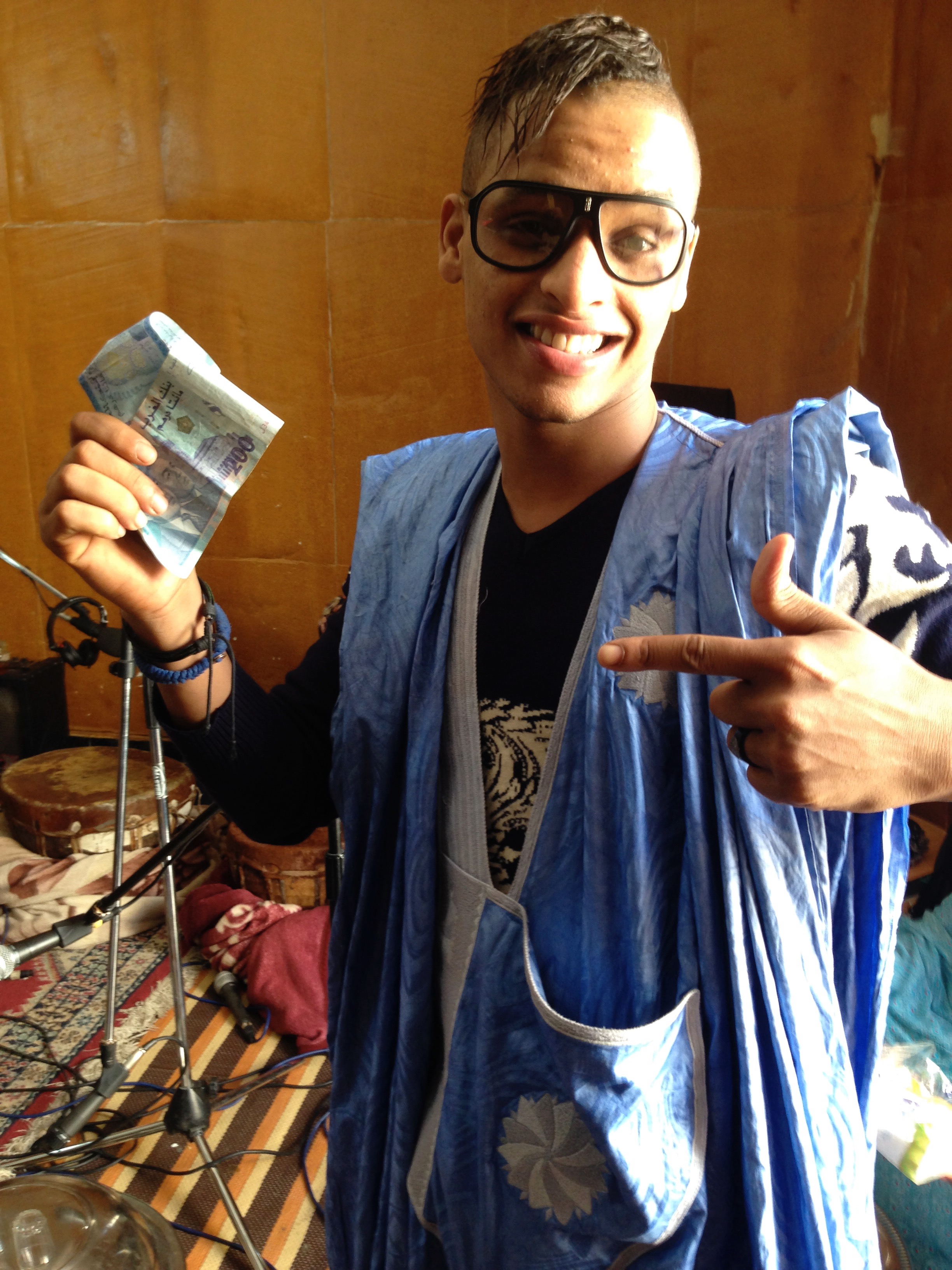 PAM : More generally, once the sessions were completed, what do you think you had been able to keep from their culture? And what’s left, one year later?
PAM : More generally, once the sessions were completed, what do you think you had been able to keep from their culture? And what’s left, one year later?
D : It reassured us in our habit to play at full volume!
E : True that! Paradoxically, we were not left with a sensation of peace, on the contrary. There was a very strong energy, coming from the fact they play songs for a very long time, so that the music runs out of control. And if I got it right, as Group Doueh is a wedding band, they’re very business-oriented. First, they receive a big fee from the wedding hosts. Then, during the ceremony, while they play under a big tent, the guests put loads of money in their djellabah’s pockets. So the crazier the concert, the more money they get from the guests.
Fête de l’Humanité, La Courneuve, September 2016 : Group Doueh enthusiastically discovers the final mix of the album – here, the song “Bord de mer”.
PAM : Now that you’ve experienced this very rough and live experience, do you reconsider the way you play music in Cheveu?
D : Well it just brought us back to our love for the ghetto punk sounding shows we used to play in the past, where we’d let the song go for a long while…
E : …and where we’d be looking for repetition that leads to trance. This is the way Group Doueh play on stage. They’re not at all interested in three-minute pop songs. It’s a wedding band, and they won’t stop playing as long as people dance! This is the direction we’re gonna take when we play shows with them in the near future.
PAM : So you took the responsibility of the “director’s cut” of the session’s recordings? With Group Doueh’s approval?
D : Yes we did: we cut, pasted, erased… except for some moments of grace, that we left untouched. Like for “Charaa”, where layers of music come on top of each other, with no need for further editing. And when we did edit, we obviously paid much attention. But anyway, you could feel that, for Group Doueh, the final production and its quality were not really their priority, even if they had already released four albums on Sublime Frequencies. It’s a live band: no need to rehearse ; no audience, no show ; don’t stop till people get enough… There’s a fundamental difference with the way we consider music.
E : And while we edited the songs, we took great care that the meaning of their lyrics remains respected. When they eventually listened to our final mix, at the Fête de l’Humanité [September 2016 at La Courneuve, France], they said they liked it.
EL WAAR IS A 20-YEAR OLD GENIUS WHO SOUNDS LIKE DR. DRE AND DROPS SOME AMAZING STUFF WITH HIS KEYBOARD!
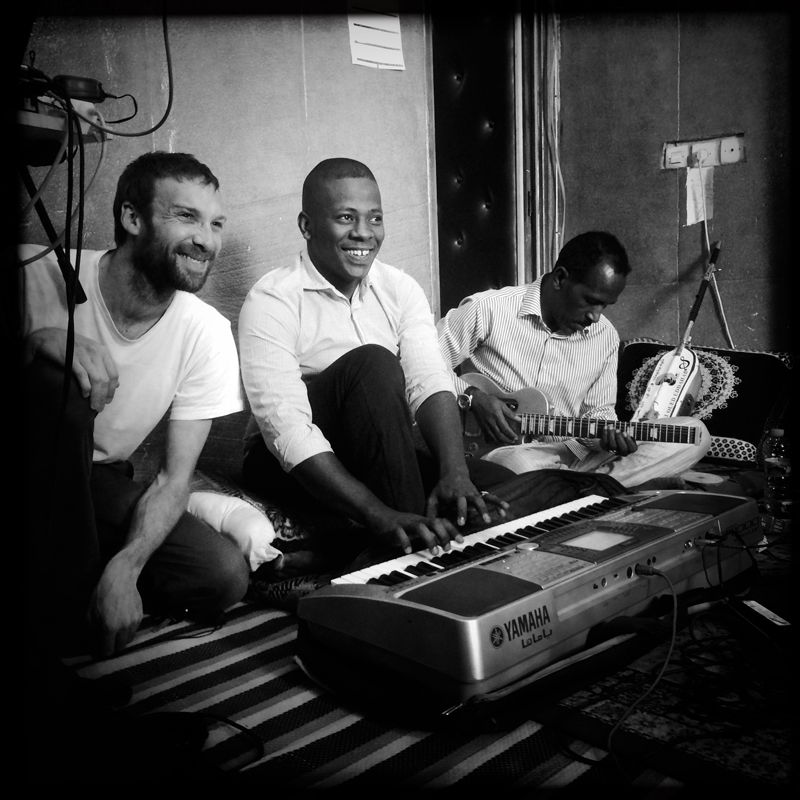 PAM : Are there gonna be future developments in Cheveu/Group Doueh collaboration?
PAM : Are there gonna be future developments in Cheveu/Group Doueh collaboration?
D : Yes, we plan to do shows together next spring and summer. We did one in Rabat, Morocco, and we were not that satisfied, so we surely have some interesting work to do here.
E : Also, in Group Doueh there’s this guy who really impressed us on the synthesizer: El Waar. He’s Doueh’s son. This guy is a 20-year old genius who sounds like Dr. Dre and drops some amazing stuff with a keyboard, that even includes quarter-tones! I guess we shouldn’t have too much difficulty having him come over here.
PAM : Did he get the reference to Dr. Dre?
D : Not at all! Their cultural reference points are completely stranger to Western pop music: they don’t know The Beatles, The Rolling Stones, Madonna, or Beyoncé…
E : Only Dire Straits and Jimi Hendrix!
D : Their whole musical culture comes from Lebanon, Saudi Arabia, Persian Gulf… The Lebanese TV is turned on all day long.
PAM : This makes me think of Somali TV in the ’90s, where they’d broadcast 3-hour long theater shows, where a band or an orchestra would perform amazingly great songs and back amazingly talented singers. But there is no discographic account of it, only VHS recordings made by people in their homes, and later uploaded on YouTube [for example, here with the amazing female singer Kinsi Haji Aadan]. You can easily imagine the audio quality of the stuff… But at last it’s not lost forever and anybody can listen to it today.
D : Amazing story! Actually, the album we did with Group Doueh is only the first step of a more global project, initiated by José Kamal, the guy who welcomed us in Dakhla. He aims to record around 20 bands of the Hassani culture, so he can preserve and promote local music. He also published a guide to Moroccan festivals. And when you know the tension there is in the region at the moment [since 1975 the land has been a disputed territory between the Moroccan government and the Sahrawi Arab Democratic Republic], I think it’s very important to promote this culture.
PAM : Were you already interested in African music before collaborating with Group Doueh?
E : Yes. I had spent a month in Mali, some time ago. I had been impressed by many street musicians, that I recorded on my MiniDisc.
PAM : Well, now you can launch your own field recordings label, like Sublime Frequencies, Group Doueh’s label!
E : Well no… The problem is that I can’t seem to find the discs. I rummaged through my flat ten times and I still haven’t found them back…
IT WAS BOTH TOO HOT AND TOO COLD IN THE ROOM, THE TEA WAS TOO STRONG, WE DIDN’T GET ANYTHING OF GROUPE DOUEH’S COMPLEX RHYTHMS… THERE WAS NOTHING EXOTIC OR IDYLLIC THERE. TO ME, DAKHLA SAHARA SESSION IS AN ANTI-WORLD MUSIC ALBUM!
PAM : What about your link to African music, David?
D : I’m not gonna answer your question at all [laughs] but it reminded me that I wanted to talk about the whole stuff around “world” or “fusion”… We would be Westerners facing an exotic culture, etc. Obviously, there’s some of this idea in this project and the album. But we tend to be suspicious of this very idea, and for Dakhla Sahara Session we prefer to stress on the reality of a simple encounter between two bands. And I can assure you it was not a pure moment of naive delight. Far from that. We went through hell: it was both too hot and too cold in the room, the tea was too strong, we didn’t get anything of Group Doueh’s complex rhythms… You see: there was nothing exotic or idyllic there. To me, Dakhla Sahara Session is an anti-world music album.
IT’S NOT A FUSION : IT’S A MUSICAL SUPERPOSITION, OR JUXTAPOSITION OF MUSICS. AND WE LIKE IT THIS WAY.
PAM : I agree this is an anti-world music album, and this is what I felt when I first listened to it. It’s rough, rugged and raw, and is not made to please the Westerners’ ears. This is just just an encounter between two cultures.
D : This is it. And if you listen carefully to the album, Cheveu never tried to play an “afro” riff, and Group Doueh never played a rock’n’roll stuff.
E : Everyone at its right musical place.
D : It’s not a fusion : it’s a musical superposition, or juxtaposition of musics. And we like it that way.
PAM : What’s next for Cheveu?
D : Something pretty different: we wrote an opera about the Italian racing cyclist Marco Pantani. We’ll perform it at the théâtre des Amandiers in Nanterre, 25th of February.
E : It’s with the three of us – Cheveu – six lead singers, around 40 choristers. The string arrangement were written by Maya Dunietz [an Israeli musician, who already wrote the strings arrangement for 1000, the band’s previous album].
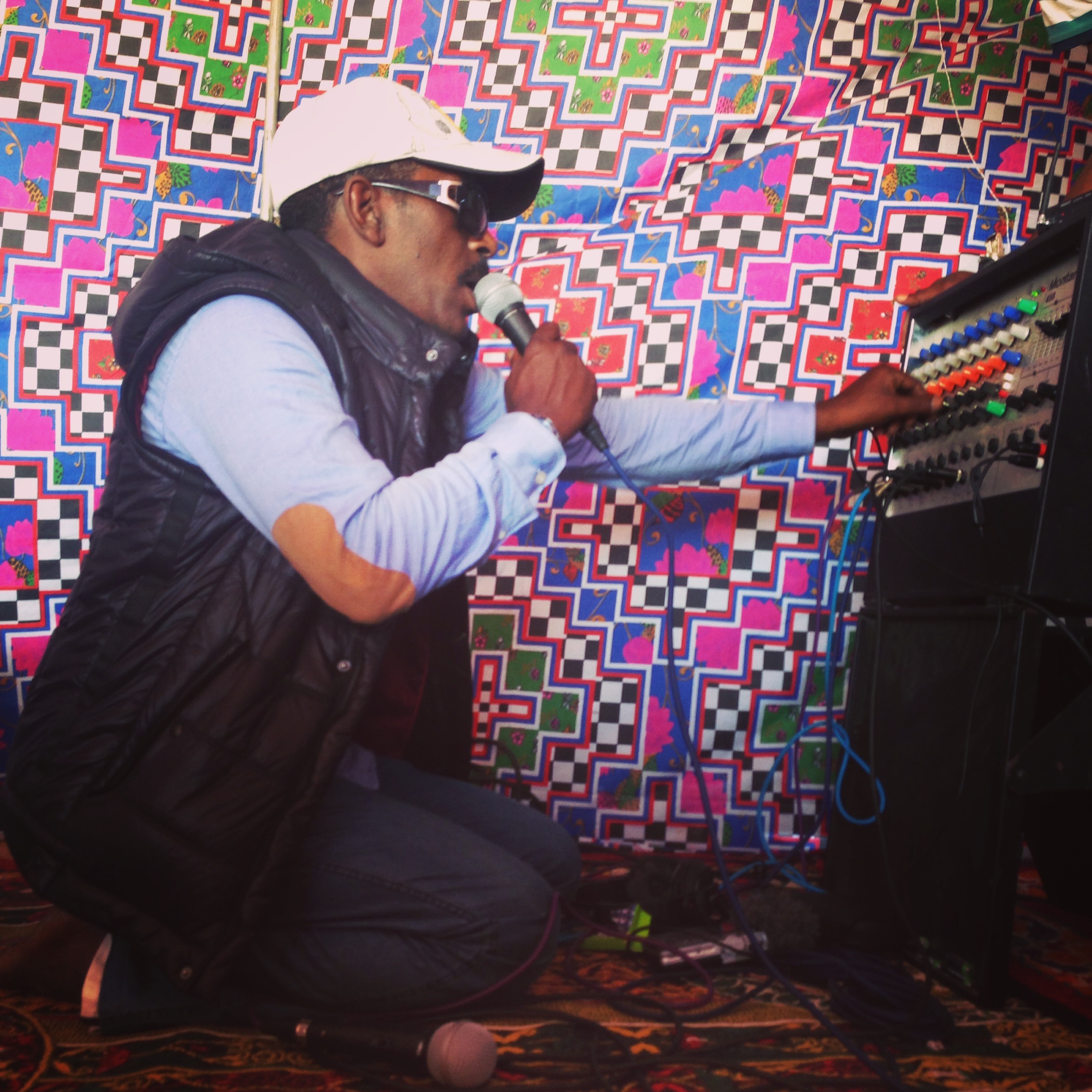
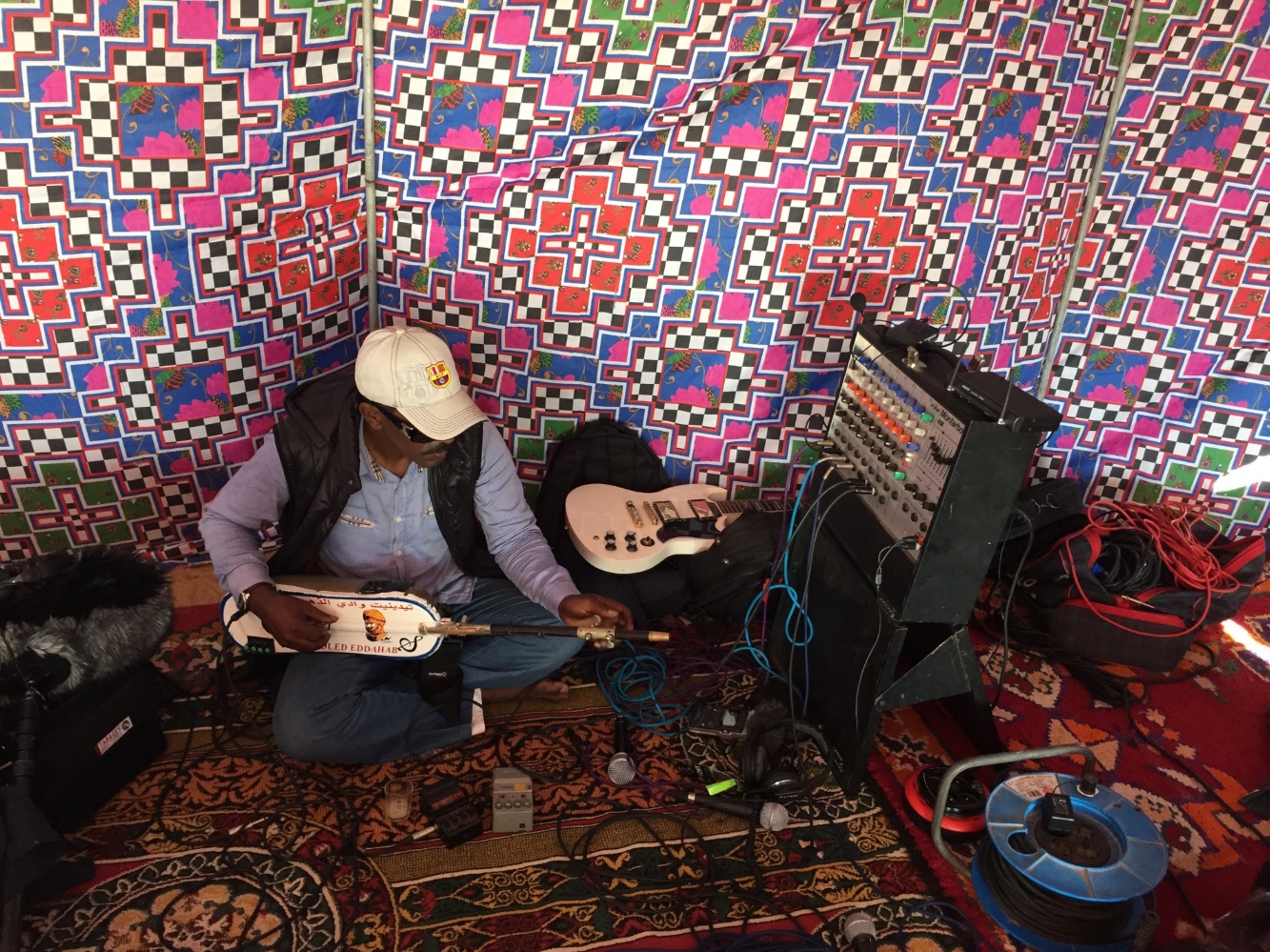
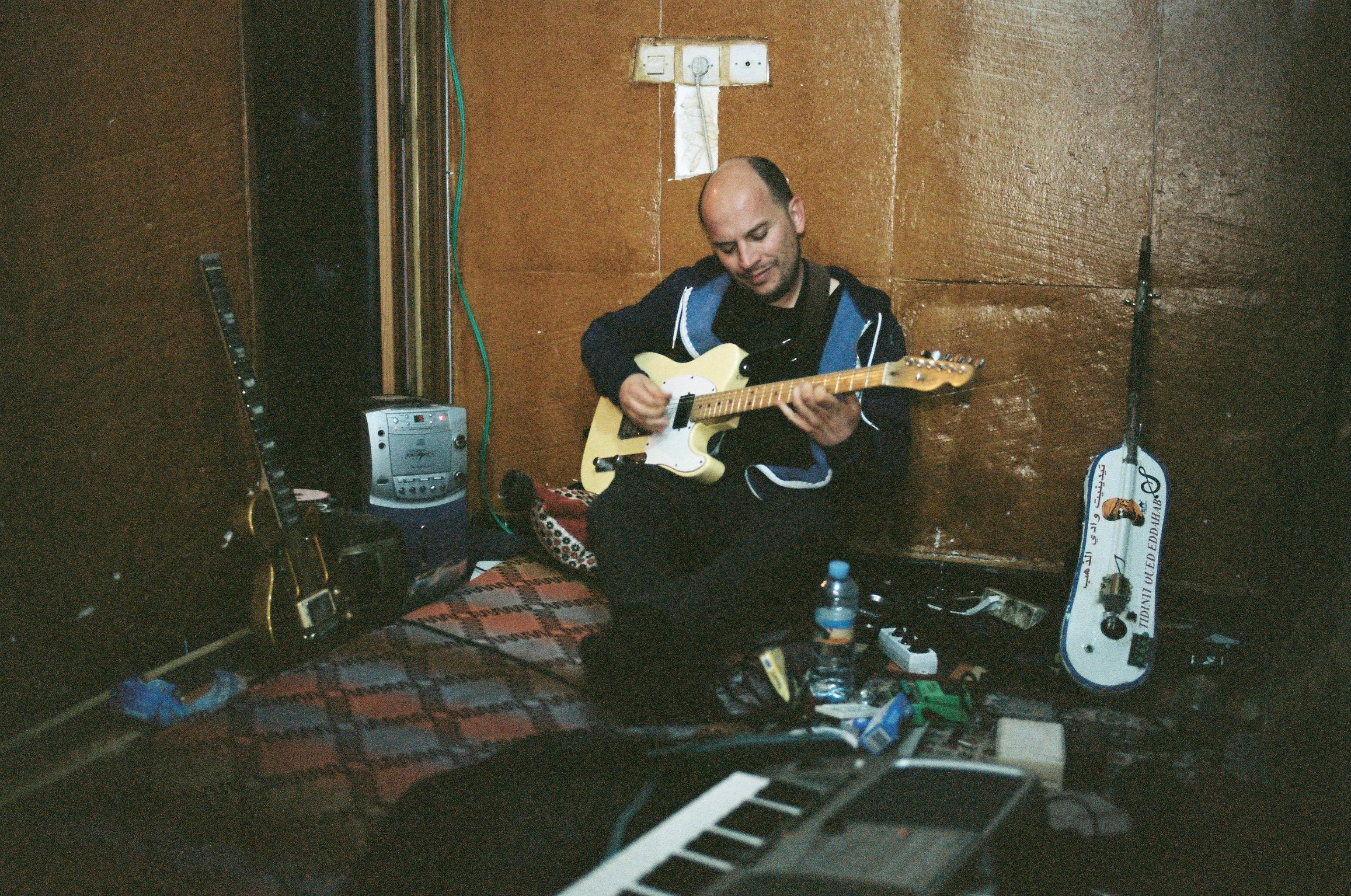
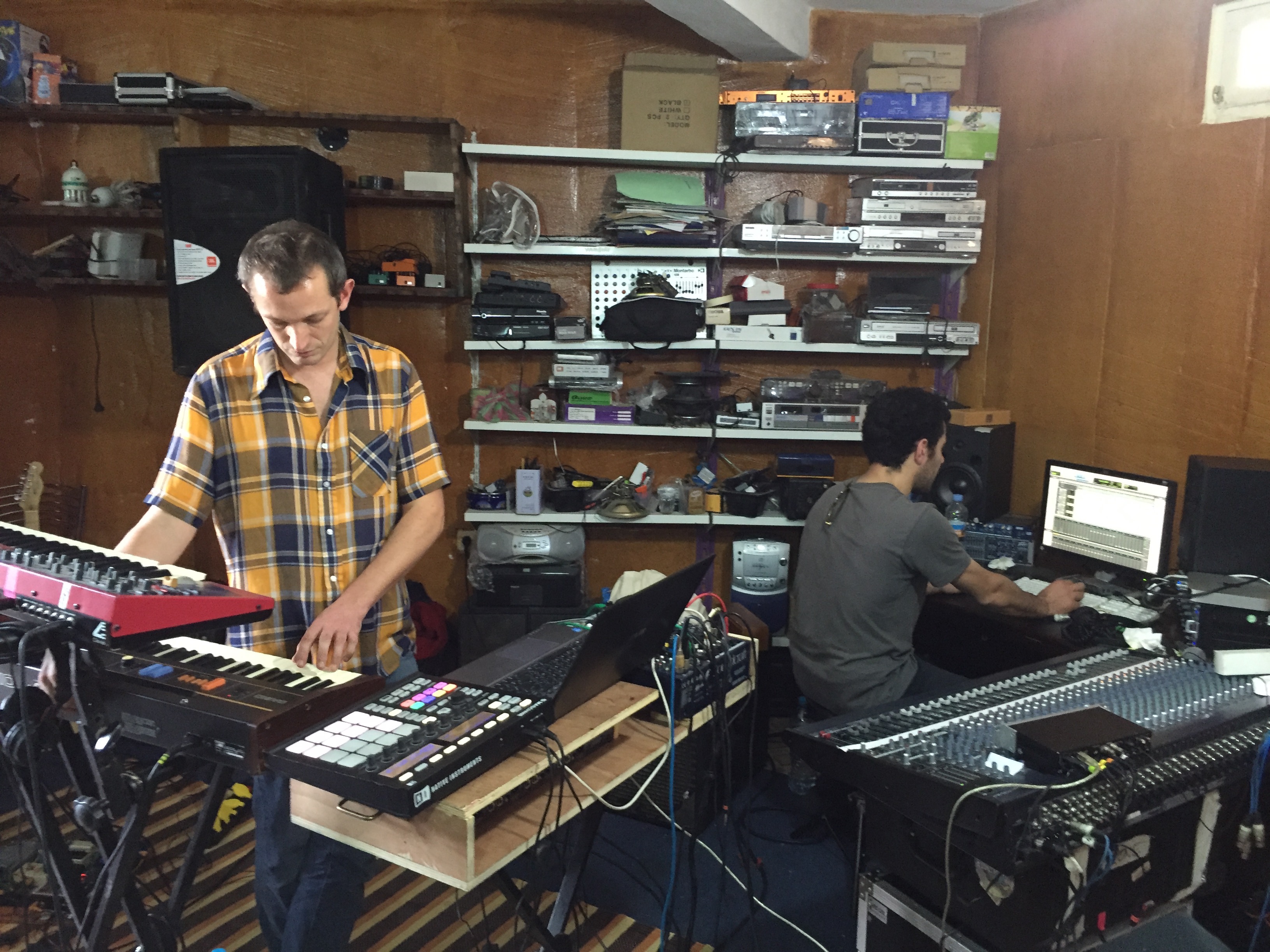
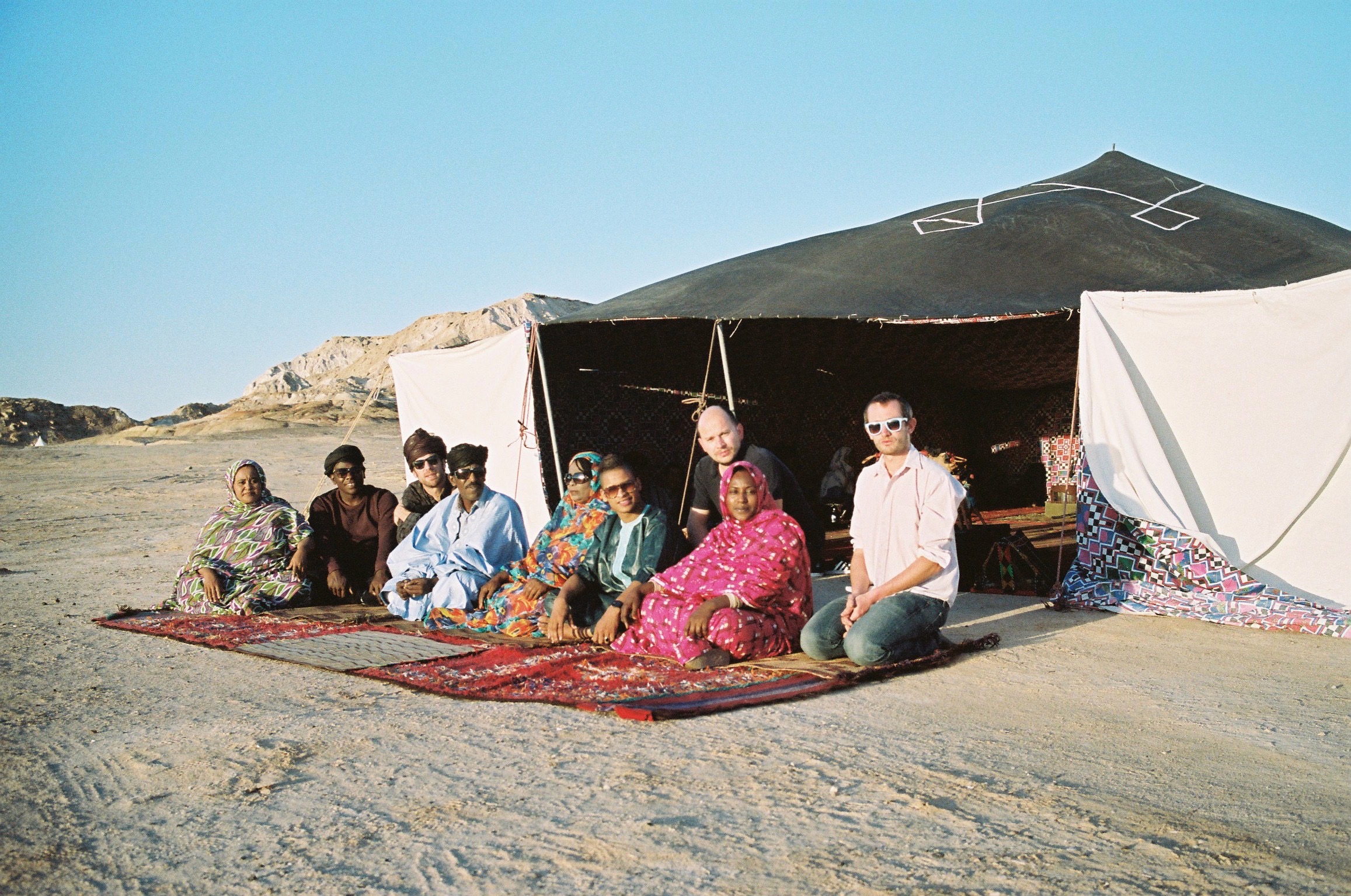
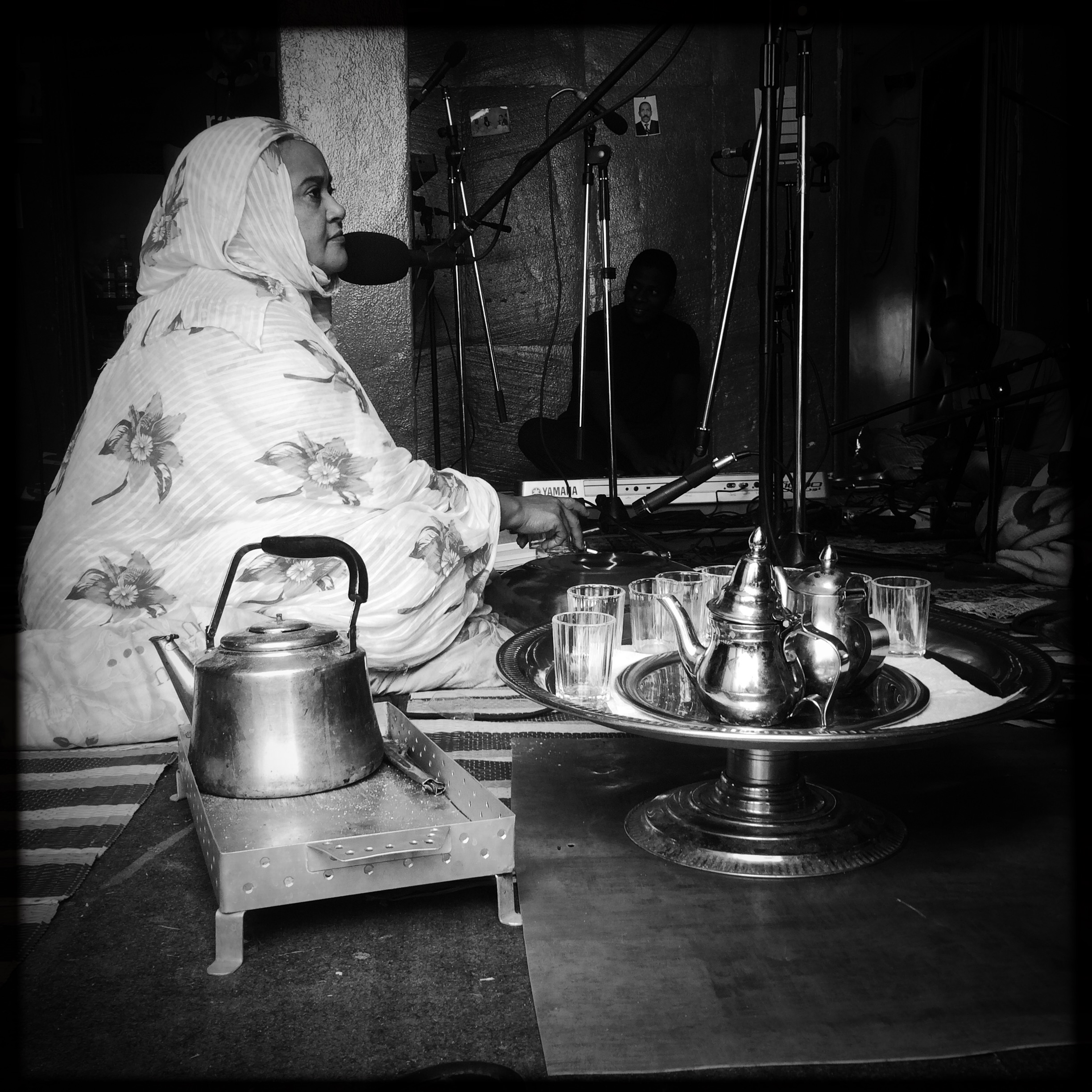
All pictures by Arnaud Contreras


